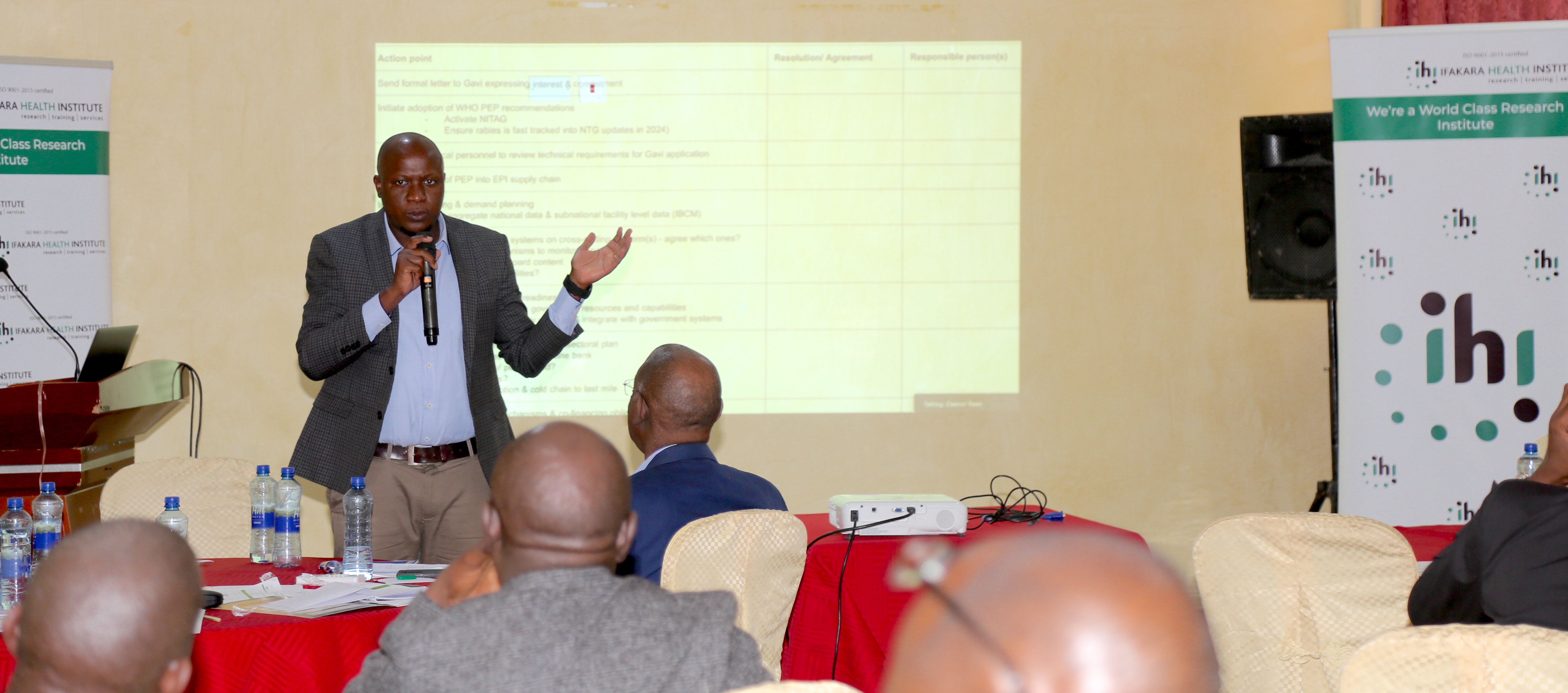
ENGAGEMENT: Stakeholders draw roadmap for human rabies vaccines

Today, the Ifakara Health Institute, in collaboration with the University of Glasgow, hosted a Rabies Elimination Stakeholders’ hybrid Meeting in Dodoma. The primary objective of this gathering was to introduce GAVI the Vaccine Alliance's plan to provide human rabies vaccines starting in 2024 and to explore how various partners can join forces to ensure that Tanzania can fully benefit from this plan.
GAVI will be investing in human Post-Exposure Prophylaxis (PEP) vaccines, a critical preventive medical treatment aimed at reducing the risk of rabies infection following potential exposure. Professor Katie Hampson, a member of GAVI's Technical Advisory Committee and professor at the University of Glasgow, described PEP as "a lifesaving treatment."
The participants comprised of Ifakara, University of Glasgow, the Ministry of Health, Ministry of Livestock and Fisheries, Office of the Prime Minister's One Health coordination section, President's Office - Regional Administration and Local Government (PO-RALG), The e-Government Authority (e-GA), World Health Organization (WHO), The University of Dar es salaam (UDSM), Food and Agriculture Organization (FAO), and Management and Development for Health (MDH).
Four key meeting components
The meeting comprised four key components. First, it served as a reminder of the significant burden that rabies places on the health system of the country and bite patients. Second, it highlighted the collaborative efforts of Ifakara and its partners in the ongoing fight against this disease. Third, it introduced the GAVI opportunity and its requirements. Lastly, it provided a platform for constructive discussions on the necessary steps to secure GAVI support towards eliminating rabies by 2030.
Professor Hezron Nonga, the Director of Veterinary Services (DVS) for Tanzania, delivered opening remarks, providing an overview of the neglected disease's impact on the country. He emphasized the seriousness with which the government views this issue, especially in regions with a high dog population like the Lake Zone and Northern Zone, where many dogs remain unvaccinated. Professor Nonga also outlined the government's ongoing efforts, including vaccination campaigns and community awareness initiatives.
He said “...the government is running vaccination campaigns which started in september and more than 300,000 dogs were vaccinated country wide thus far. We also conducted community awareness and education on how the people can protect themselves and their animals.” He closed by calling upon collaboration of stakeholders in order to eliminate the disease.
Dr. Honorati Masanja, the Chief Executive Director of Ifakara, underlined the importance of the meeting for Ifakara and Tanzania as a whole. He emphasized Ifakara's wealth of data and information gathered over the years of combating the deadly disease and stressed the need for multisectoral collaboration to seize the opportunity presented by GAVI, stating that “...it is something that Tanzania should not miss.”
Ifakara’s work in rabies
Dr. Kennedy Lushasi, the Ifakara’s Rabies Elimination Project Leader advocated for Tanzania to be an early adopter of the GAVI plan. He presented evidence of successful rabies elimination initiatives, such as Mass Dog Vaccination (MDV), which led to Pemba Island being declared rabies-free. He called for the scaling of MDV efforts and increased accessibility to vaccines to achieve the goal of rabies elimination by 2030.
He also highlighted Ifakara's work in rabies surveillance, including Integrated Bite Case Management (IBCM) and contact tracing, which has enhanced case detection and empowered healthcare workers with real-time data for informed decision-making. He recommended harmonizing this system with existing government systems so that they “benefit from the system, to monitor regions and districts to be able to better inform decisions” with real-time data.
>> Learn more about IBCM here and Ifakara's work here
How Tanzania can seize the opportunity
Professor Hampson provided an overview of GAVI's 5-year Investment Strategy (VIS), application requirements, and the necessary actions required for Tanzania to meet these requirements. She stressed the importance of demonstrating multisectoral collaboration.
>> Learn more about Gavi Investment Strategy here
Next steps
Facilitated by Ifakara scientist and rabies expert, Dr. Maganga Sambo, the partners discussed the way forward, with key individuals and institutions identified to take responsibility and a timeline for each action item. Together, they are committed to the collective goal of eliminating rabies in Tanzania and fostering a safer, healthier future for the nation.
Understanding Rabies
Rabies is a viral disease that affects mammals, including humans, primarily transmitted through the bite of rabid animals, especially dogs. It attacks the central nervous system and can lead to fatal symptoms if untreated. Immediate medical attention, including PEP, is essential after a suspected rabies exposure.
It's estimated that 1,500 people die annually in Tanzania from rabies, a disease that can be prevented through vaccination.
>>Learn more about rabies here
Vaccination campaign in Tanzania
In May 2021, Ifakara collaborated with the African Regional One Health University Network (AFROHUN), Food and Agriculture Organization (FAO), UN agencies, and local ministries, to carry out a rabies vaccination campaign in Kisarawe District, Tanzania.
This collaborative effort aimed to combat rabies, a preventable but deadly disease, with the goal of eliminating it in Tanzania by 2030. The campaign involved vaccinating 5000 dogs and engaged students from Sokoine University of Agriculture and Muhimbili University of Health and Allied Sciences in providing vaccines and community awareness activities.
>>Read more about the campaign here
